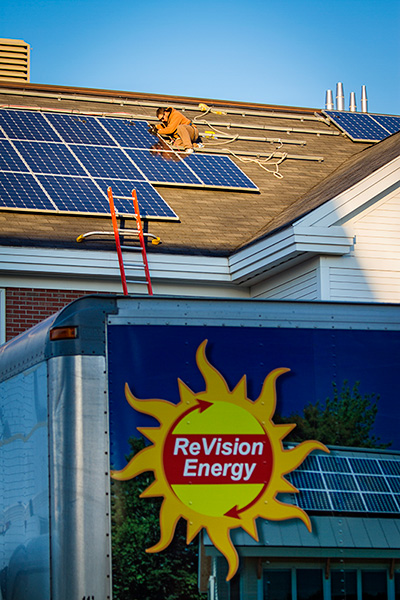Colby-Sawyer College Reaches for the Sun with Solar Array
NEW LONDON, N.H., Nov. 30, 2012 – Colby-Sawyer College has partnered with Exeter, N.H.-based ReVision Energy to build one of the largest solar photovoltaic arrays in New Hampshire. A solar photovoltaic array is composed of a series of panels that use the sun's abundant energy to create electricity. A total of 517 solar photovoltaic panels have been installed on the roofs of four campus buildings: Windy Hill School, Curtis L. Ivey Science Center, Lawson Hall and Lethbridge Lodge.
The installation of the 127 kW solar array is a significant step toward the college's long-term goal of becoming a carbon-neutral campus by 2050. It offers the immediate benefits of saving approximately $3,000 in the first year on electricity while providing a visible manifestation of Colby-Sawyer's commitment to sustainability and an example of a renewable energy system on campus. The college anticipates a 197,990-pound reduction in its carbon emissions in the first year by generating approximately 152,000 kWh annually through its solar array. “ReVision Energy is a mission-driven company that wants to get more renewable energy systems out there in the world and reduce dependence on fossil fuels. As a business, ReVision can take advantage of the 30 percent federal tax credit, state rebates and other financial incentives that nonprofits in New Hampshire can't actually access,” says Colby-Sawyer's Sustainability Coordinator Jennifer White.
The $509,000 project is financed through a Power Purchase Agreement (PPA) between Colby-Sawyer and ReVision in which the college pays no up-front costs. ReVision leases the roof spaces from the college for a nominal fee and will own and operate the panels for six years, after which the college has the option to purchase the panels. Power generated by the panels feeds into the existing electrical system of each building, and Colby-Sawyer will pay ReVision a discounted rate for the power the panels generate.
“With the tremendous reduction in solar electric panel prices since 2008, ReVision Energy is proud to show that solar power is actually substantially more cost effective than our traditional fossil fuel-based power generators,” says Steve Condon, sales and marketing manager with ReVision. “Generating our electricity from the sun is predictable, available, and has no negative impact on the surrounding environment. And, the campus will save money on day one.”
On Colby-Sawyer's behalf, ReVision applied for and was awarded a $100,000 grant from the N.H. Public Utilities Commission (NHPUC). “For six years, Colby-Sawyer will write two checks to pay for electricity, one to Public Service of New Hampshire (PSNH) and one to ReVision,” says White. “Combined, the total is less than what we would have been paying otherwise, thanks to the grant, the rebates and ReVision's discounted rate for the solar power produced.” With a lifespan of up to four decades, the panels should still be in prime condition in six years, when Colby-Sawyer will have the option to purchase the system from ReVision. When the system is college-owned, all power generated by the panels will be free.
Keeping a Promise
Colby-Sawyer's goal of achieving a carbon-neutral campus by 2050 was established in its 2010 Climate Action Plan. The plan is a flexible document designed to guide the college toward two related visions: The quantitative achievement of climate neutrality and the qualitative embodiment of whole systems sustainability. This will require collaborative action across the college in six interconnected areas: Energy; transportation; water and biodiversity; food; waste and consumption; and culture, curriculum and investment. Milestones along the way include a 50 percent reduction in emissions by 2015 and a 70 percent reduction by 2020.
In 2007, President Thomas C. Galligan Jr. first committed the college to reducing its global warming emissions and accelerating efforts to educate its community about ways to stabilize the earth's climate. The pledge was formalized with his signing of the American College & University Presidents' Climate Commitment.
“Climate change and global warming are among the defining issues of our time,” President Galligan said then. “We believe human activities have significantly contributed to the problem and we are committed to working together to solve it. Creating a culture of concern for the environment, including a commitment to sustainability, is critical to our success. Colby-Sawyer College is proud to be among those leading the way.”
Since 2010, Colby-Sawyer has been powered by renewable energy through the purchase of renewable energy certificates (RECs).
Sustainability at Colby-Sawyer
Colby-Sawyer College runs on renewable energy—and it runs on student energy, too. A campus culture of concern for the environment and dedication to sustainability has taken root as GreenROUTES, a student-driven initiative to reduce the college's environmental footprint; minimize waste; reduce the need and usage of gas, electricity, paper and food; and improve the quality and efficiency of buildings. Sustainability principles are put into practice through zero-sort recycling and zero-waste events, and purchasing guidelines that reduce our waste and energy use. The college's newest building, the Windy Hill School, achieved Silver-level LEED certification as a green and healthy building.
The college offers classes in Fair Trade, Environmental Law, Sustainable Living and Permaculture, and other classes have integrated sustainability principles and issues into the curriculum. Additionally, a new concentration in Sustainable Business has been created within the Business Administration major.
Many of our students across majors are engaged in helping the college meet its sustainability goals. Here are some examples of what they're doing:
• Students are designing and building a green classroom using locally sourced materials and renewable energy.
• Students plant and tend the college's organic vegetable garden.
• Students are award-winning Eco-Reps who educate their peers and the wider community about the power we all have to make a difference.
• Students are raising funds to bring wind and solar systems to campus.
• Our award-winning Students in Free Enterprise (SIFE) team is working to create an Eco-House and a bike share program.
To learn more about Colby-Sawyer's sustainability efforts:
Read the GreenROUTES Climate Action Plan for Colby-Sawyer College.
Learn more about sustainability at Colby-Sawyer.
Learn more about Colby-Sawyer's Environmental Studies Department.
Read about President Galligan's Commitment to a Climate Neutral Campus.




